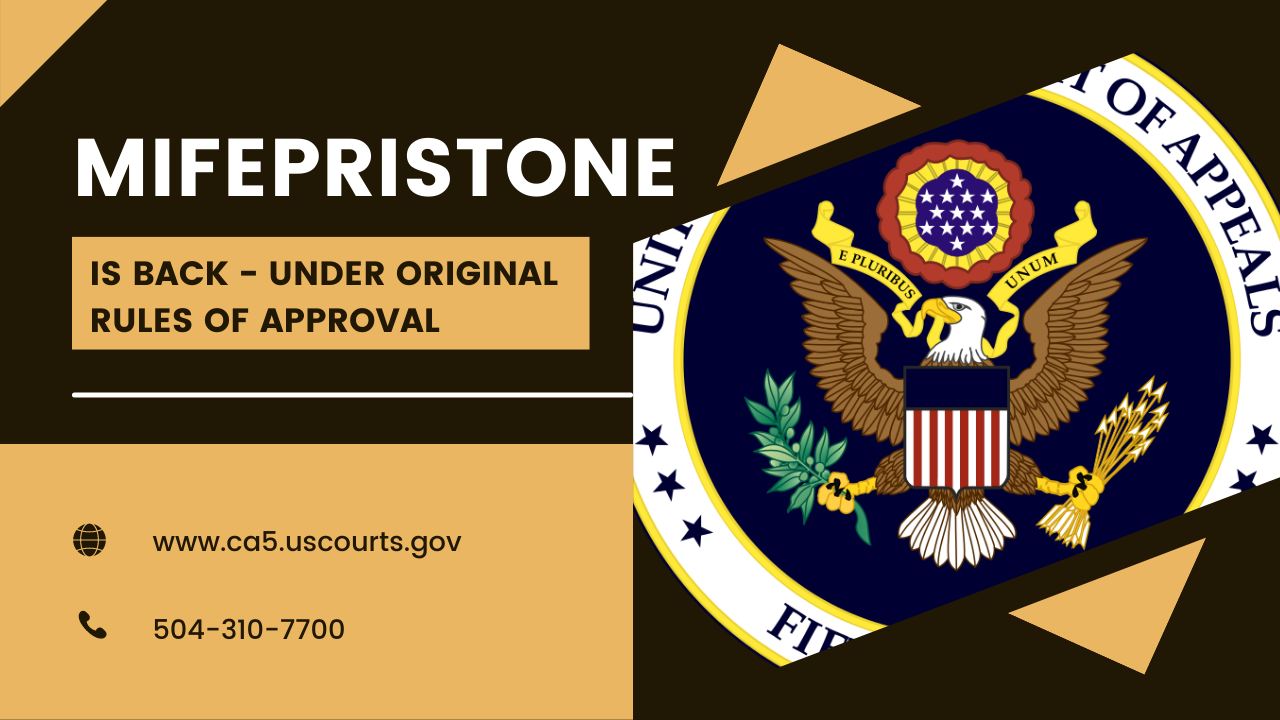Executive
Fifth Circuit reinstates mifepristone – under original regime
The Fifth Circuit Court of Appeals reinstated mifepristone as an approved drug – but only under the original 2000 approval regime.

Late on the night of April 12, 2023, an appellate court reinstated mifepristone as an approved drug – but only under the restrictions and other conditions of the approval of the drug in 2000. Every change from 2016 onwards remains “stayed” until further notice.
Fifth Circuit issues mixed ruling
The Court of Appeals for the Fifth Judicial Circuit issued an emergency ruling in response to an emergency appeal by the Food and Drug Administration, the Department of Health and Human Services, and Danco Laboratories, the current mifepristone distributor. (The Population Council originally acquired the intellectual-property rights to the drug from its developer, Roussel-UCLAF S.A., now part of Sanofi.)
The Court found that the plaintiff’s (Alliance for Hippocratic Medicine et al.) arguments against the 2000 approval of the drug were out of time. However, the plaintiffs had also argued against changes made to that approval in 2016 and forward. Those arguments, the court held, were timely. Therefore, mifepristone remains available – but under the 2000 restrictions and conditions. (Alliance for Hippocratic Medicine et al. v. Food and Drug Administration et al., case 23-10362, doc. 183-2, 12 April 2023.)
At this preliminary stage, and based on our necessarily abbreviated review, it appears that the statute of limitations bars plaintiffs’ challenges to the Food and Drug Administration’s approval of mifepristone in 2000. In the district court, however, plaintiffs brought a series of alternative arguments regarding FDA’s actions in 2016 and subsequent years. And the district court emphasized that its order separately applied to prohibit FDA’s actions in and after 2016 in accordance with plaintiffs’ alternative arguments. As to those alternative arguments, plaintiffs’ claims are timely. Defendants have not shown that plaintiffs are unlikely to succeed on the merits of their timely challenges.
Earlier actions
Judge Matthew J. Kascmaryk of the U.S. District Court for the Northern District of Texas (Amarillo Division) stayed all FDA approvals of mifepristone last Friday. In his ruling he found that the
FDA stonewalled judicial review – until now.
Specifically he found that the plaintiffs filed a challenge two years after the fact (2002), and the FDA sat on their challenge for 4,971 days. This put the FDA in violation of statute that requires action on such a challenge within 180 days. It also, as one may infer from his specific discussion of “what took them so long,” stopped the clock. Evidently the Fifth Circuit did not follow Kascmaryk’s reasoning, but recall their reference to their “necessarily abbreviated review.”
The Justice Department directly challenged the District Court’s authority and asserted that there existed no
basis in administrative law for the district court’s unprecedented overriding of FDA’s considered scientific judgment.
And that the ruling “ignored decades of established science,” according to Nathaniel Weixel of The Hill, which reported this story early this morning (April 13).
Specific holdings
The Fifth Circuit for the first time acknowledged that the FDA asserted that pregnancy was “a life-threatening illness.” Even Judge Kacxmaryk did not go quite that far,l except only by inference, not direct statement.
The appellate court also held that the plaintiffs have standing in every particular in which they have asserted standing. It did so on the particulars of the kinds of complications doctors see every day with mifepristone. In the process they threw out the absurd argument by the FDA that mifepristone is no more dangerous than ibuprofen. The court cited the package insert to disprove that.
The timeliness question is trickier. One may petition to challenge FDA action six years after a petitioner has a right to act. The “2016 changes” the FDA made, and every FDA action subsequent to that, fall within the six years. But the right of action for the 2000 approval dates from March 29, 2016 – the day the FDA finally acted on the petition against the 2000 approval. The plaintiffs didn’t file suit until November 18, 2022 – and on that basis the Fifth Circuit finds their suit untimely. Judge Kacsmaryk held that the FDA had reopened the case with their 2016 changes; the Fifth Circuit is not so sure. Kacsmaryk also found the plaintiffs entitled to “equitable tolling” of the statute of limitations. The Fifth Circuit disagreed.
However, the Fifth Circuit also expedited the case “to the next available Oral Argument Calendar.”
Terry A. Hurlbut has been a student of politics, philosophy, and science for more than 35 years. He is a graduate of Yale College and has served as a physician-level laboratory administrator in a 250-bed community hospital. He also is a serious student of the Bible, is conversant in its two primary original languages, and has followed the creation-science movement closely since 1993.
-

 Accountability4 days ago
Accountability4 days agoWaste of the Day: Principal Bought Lobster with School Funds
-

 Civilization1 day ago
Civilization1 day agoWhy Europe Shouldn’t Be Upset at Trump’s Venezuelan Actions
-

 Executive2 days ago
Executive2 days agoHow Relaxed COVID-Era Rules Fueled Minnesota’s Biggest Scam
-

 Constitution3 days ago
Constitution3 days agoTrump, Canada, and the Constitutional Problem Beneath the Bridge
-

 Christianity Today1 day ago
Christianity Today1 day agoSurprising Revival: Gen Z Men & Highly Educated Lead Return to Religion
-

 Civilization2 days ago
Civilization2 days agoThe End of Purple States and Competitive Districts
-

 Executive2 days ago
Executive2 days agoWaste of the Day: Can You Hear Me Now?
-

 Civilization5 days ago
Civilization5 days agoThe Conundrum of President Donald J. Trump










